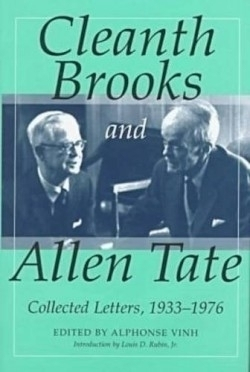
Cleanth Brooks and Allen Tate
Collected Letters, 1933-1976
Allen Tate and Cleanth Brooks were both born in Kentucky near the turn of the century, both attended Nashville’s Vanderbilt University, and both were active participants at a time when reading and teaching poetry at the college level was going through a metamorphosis. This book chronicles in correspondence that early literary struggle and takes a peek at their 50-year friendship.
Brooks (1906-1994) and Tate (1899-1979) first met in Paris during the winter of 1929. While at Vanderbilt, Tate had helped found the Fugitives, a group of Southern writers who hoped to preserve the cultural heritage of their homeland, the South.
Brooks, seven years his junior, thought of Tate, a poet and literary critic, as a mentor. In one of the last letters written between the two, Brooks writes: “Why shouldn’t I say it now-we are both old enough-that from a very early period you were my special hero as man of letters and that you remain one of the three or four people from whom I have learned most.”
The 250 letters cover the period from December 1933 to September 1976 and are interspersed with talk of their careers, personal writing projects attempted, various relocations across the country and family life. (In his late 60s, Tate became a father for the first time. Brooks’ wife of 53 years, Edith Blanchard-always referred to by her childhood nickname, Tinkum-was a steadfast companion throughout their years together.)
A minor eruption and war of words is reported and followed in letters written in 1949. That was the year the seven poets comprising the Fellows of the Library of Congress awarded the Bollingen Prize in Poetry to Ezra Pound, then incarcerated in an asylum in Washington, D.C. It provoked a controversy which Brooks and Tate somewhat gleefully played a part as evidenced in their correspondence that year. (They supported the Fellows’ choice.)
These collected letters offer a glimpse into the personal lives of two men whose professional lives were intertwined with that of other major literary figures of the 20th century.
The book was edited by Alphonse Vinh. A writer and Reference Librarian for National Public Radio in Washington, D.C., Vinh also knew Brooks and worked with him during the last years of Brooks’ life.
Reviewed by
Robin Farrell Edmunds
Disclosure: This article is not an endorsement, but a review. The publisher of this book provided free copies of the book to have their book reviewed by a professional reviewer. No fee was paid by the publisher for this review. Foreword Reviews only recommends books that we love. Foreword Magazine, Inc. is disclosing this in accordance with the Federal Trade Commission’s 16 CFR, Part 255.
